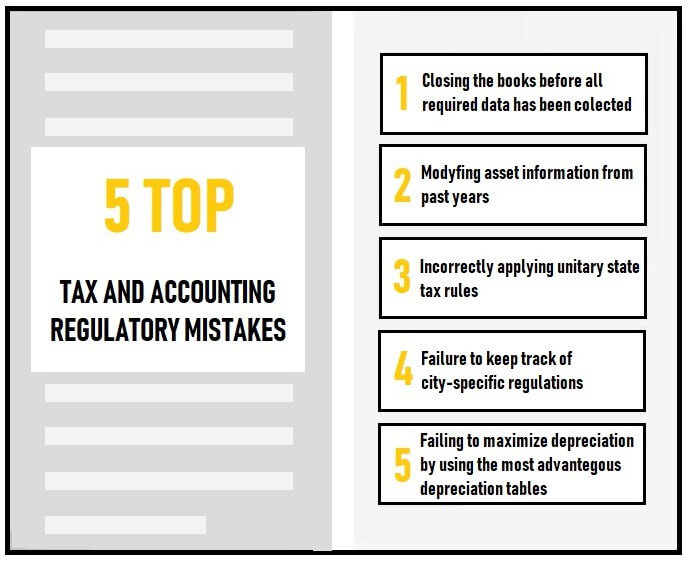Constant stress and pressure revolving around running a company should be by no means any mystery to you. Let’s face it — dealing with tremendous amount of paperwork, and trying to get a grip on inconsistent manual processes in tax and accounting may be overwhelming… to say the least. There is not a single data company in the world that doesn’t care about reducing costs. In fact, it’s the number one item every worker hears from their bosses — no matter how high or low they sit on the corporate ladder.
So, the big challenge is to somehow do much more with less…. and do it better.
Sounds easy, right? Take a look at the statistics to get a full picture of the problem we’re dealing with.
- U.S companies amassed almost $7 billion in IRS civil penalties due to incorrect data handling and spreadsheet errors.
- 27% accounting mistakes are made because of incorrect tax data entry, according to Bloomberg’s BNA study from 2015.
- 69% of companies document internal processes, but only a staggering number of 4% measure and manage them, according to process maturity of 236 Polish companies from 2016.
“Okay, but are there any long-term solutions that are applicable to MY company?”
Luckily, you might have found the right piece of content.
The rapid growth of artificial intelligence in the recent decade helped with developing advanced modular software addressing the accounting needs of any company — no matter how big.
See also: 3 AI-based Solutions Every Commercial Bank Needs
Our team at DLabs has specialized in creating algorithms that will help you not only reduce costs and time but also improve accuracy, ROI, and increase productivity concerning accounting tasks. How much more could you have had for?
But first things first — This article will help you understand, why AI solutions is something you desperately need. Right now.
3 most painful accounting problems that are draining your company dry
It doesn’t matter if you’re a CEO of a shared services center, CFO, or someone running a small business down the street — the problems concerning accounting and taxation are universal. For the most part, the errors in documentation and legislation amass slowly and without much notice. Ignoring management reporting will unavoidably lead to serious accounting problems that will shift your focus from what matters most, leading to massive, financial loses.
- Astonishingly, according to Bloomberg’s BNA study from 2015, more than 50% of the surveyed companies are much likely to hire more personnel to deal with accounting tasks, rather than solve actual problems in taxation and rule out deficiencies.
It means, that businesses are more willing to sweep things under the rug, than try to solve real, outlying problems.
And that happens, because companies are unaware of the scale of manual labor accounting errors that eat businesses alive.
1. Manual errors
Manual accounting systems relying on human accuracy are naturally prone to errors. Even the most qualified staff won’t save you from accounting blunders — and they will happen, sooner or later. Punctuation, spelling, grammar, misinterpretation of data, not saving work or mistyping in the wrong fields are all common in most data field entries.
Read also: 3 AI Solutions for Tax and Accounting That Will Help You Keep Your Business Alive
Input errors are by far the most widespread problem, contributing to 27, 5% of all manual problems in accounting. Data may come from a huge variety of sources: paper documents, e-mails, web-based forms, etc. Each one of them needs to be integrated into one, core format. Not only does it add additional processing time, but also increases the chance that mistakes will be made: paying incorrect amounts, or duplicating invoices, which all may result in late-payment penalties.
Input errors may hurt your company… but have you ever heard about one mistype that cost $1.1 trillion ?
In 2010 Wall Street suffered a massive heart attack. In sheer moments the stock market plunged over 1000 points for reasons totally unknown. The so called “flash crash” wiped over $1.1 trillion of investor dollars. Although most of it was quickly regained, the market was shaken to the bones. What happened, you ask?
Well, it appears that one keystroke error was to blame. The letter “B” was typed in in a sell order, instead of the letter “M”.
Other types of manual errors may also squeeze the life out of your company. According to Bloomberg’s survey , some of the most impactful ones are:
- Saving a file with corporate, financial or tax information to a personal device and corrupting the data (18% of all errors)
- Accidentally deleting a custom Excel formula used to calculate corporate tax data (17% of all errors)
- Overriding data in an enterprise system with figures calculated outside of the program (13% of all errors)
2. Regulatory missteps
Although not as common, regulatory errors are much harder to spot than manual ones. Rule-based mistakes may be much more costly, particularly if a certain behavior is being unnoticed for months….. or even years.
In 2009 Bank of America miscalculated its regulatory capital. The error was carried over up until 2014 when it was noticed….. resulting in a $7.7 million fine.
Pretty unfortunate, don’t you think?
- Misinterpretation or lack of data is a crucial problem often seen in data entry. Clerks might interpret various data strings differently and impressions may not often be accurate. As it turns out, this type of error might lead to disastrous consequences.
- Premature closing of books before all required data has been collected. It’s one of the most common regulatory errors( 12% of all accountant errors in Bloomberg’s study).
- Incorrect application of unitary tax rules which may be unique in one country, but completely irrelevant in China (for example), where governments have their own rules that may be sanctioned by their central government (cited by 10% of responders).
 Source: Bloomberg’s BNA Study, 2015
Source: Bloomberg’s BNA Study, 2015
Even the smartest clerks from NASA aren’t immune to disastrous mistakes.
The Mars Climate Orbiter disintegrated in the planet’s atmosphere, exceeding the safe landing trajectory by a huge margin.
The cause? Unit conversion.
NASA’s internal process never included a step to make sure their units were consistently imperial or metric. Lack of conversion led to complete obliteration of the satellite, costing 193$ million.
3. Time consumption
When it comes to data entries, no matter how fast you type, think, or process information, speed will always cause problems. Accounting functions based on manual work involve paper journals, ledgers or similar tools that require copious time to complete specific tasks.
“All right, but I’m hiring numerous clerks and accountants with years of experience, they should be fast and focused enough to complete most tasks, right?”
Well, that’s not entirely true.
A study publicized in Cognitive Neuropsychology on Circadian rhythms in human cognition claims that individual differences in patterns of circadian arousal (the time day which we are most alert) correlate with performance on a variety of cognitive tasks, such as office work. It also proves that such performance peaks more or less regularly at a specific point in the day.
Bottom line is, your staff will EVENTUALLY make a mistake due to lack of focus: we’re all humans after all.
Audits that take centuries to finish — It’s no secret that audits are the real bane of every organization’s existence. Digging through hundreds of file drawers to find the right piece of information and pull it all together for auditors in time sounds all too familiar, doesn’t it?
Imagine if all this could be accessed from a centralized location and all steps within an accounting workflow could be tracked.
Paper invoices requiring too many hours — Invoices require cross-reference checks to ensure their accuracy. It means accountants have to manually compare them to a PO (purchase order) or a contract. Some of them require several levers or approval (like sending them from desk to desk for weeks to no end…)
Tax and accounting mistakes may be deadly and costly. Read our next article to find out specifically, how A.I can help you with battling all of the outlying (and hidden) problems and learn how people at DLabs deal with specific, accounting problems.
How mistakes in tax and accounting are slowly killing your business from the inside: the need for… was originally published in DLabs.AI on Medium, where people are continuing the conversation by highlighting and responding to this story.







